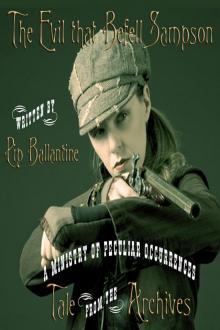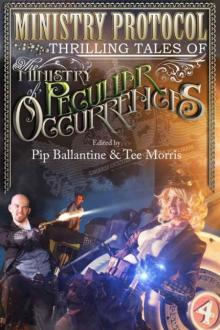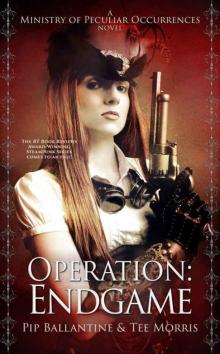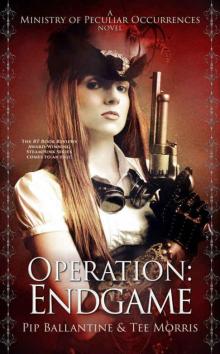- Home
- Pip Ballantine
Thrilling Tales of the Ministry of Peculiar Occurrences Page 6
Thrilling Tales of the Ministry of Peculiar Occurrences Read online
Page 6
None knew the story of bloodshed by young Bertie Bannigan—angry at the world for the conflict tearing his home apart, and meddling where those of flesh and blood should not. Although peculiar occurrences were this organisation’s specialty, Miss Snow did prefer it when such occurrences came from the minds and madness of men, not gods.
Some months later, as Miss Snow stood in to witness the recruitment of the newest Ministry agent—a certain fresh-faced Irish girl with eyes like a tropical sea—reports from the province of Connacht declared the famine over. In fact, the potato crops were coming in strong and healthy.
The Archivist, Mr Robertson, had confirmed in writing her assertion of sluagh influences, and Director Fount had determined that as the artefact was securely tucked away, Galway would see no more obvious meddling. It was all the Ministry was qualified to do, after all.
“Come, Miss Kennedy,” she called, mandate in hand. “There’s a rash of vanishing bloomers from County Clare to investigate.”
Gods and Folk, magic or madmen, it didn’t matter what was out there. All agents should start small. A pattern of missing bloomers seemed a lovely change of pace.
The girl hurried to catch up, eyes sparkling.
“Yes, Miss Snow!”
Chinoiserie
Tiffany Trent
“You can scarcely imagine the beauty and magnificence of the places we burnt. It made one’s heart sore to burn them; in fact, these places were so large, and we were so pressed for time, that we could not plunder them carefully. Quantities of gold ornaments were burnt, considered as brass. It was wretchedly demoralising work for an army.” —Charles George Gordon, 1860
Yuanmingyuan (Old Summer Palace), Peking
October, 1860
The Chinese Imperial torturers are excellent at their craft. That is well-known. For twenty days and nights, they kept our English delegation alive, for little more than their own pleasure. When they released a journalist and junior envoy, the men were incapable of speech and could not walk.
In retaliation, Lord Elgin decided to destroy their most precious landmark, that place they call Yuanmingyuan, the Gardens of Perfect Brightness, also known as the Qianlong Emperor’s Old Summer Palace.
A vast complex of water gardens and mazes of intricate beauty, the Old Summer Palace has been slowly expanding according to the Imperial desire for one hundred and fifty years. The French, charmed by its beauty, called it the Versailles of the East and sent architects to help design the residence of the Emperor’s favourite Mongolian concubine. Or so the Archives said, when I researched under the auspices of Agent Robertson a few months ago.
The Ministry has feared that many Chinese antiquities will be lost in the wars that have rent her apart in recent years. We are ill-prepared to deal with the occult arts of the East. I was sent to recover what I could before more might be lost.
All of them—the archivist, Ministry Director Phund, his fellow agents there and in the Hong Kong office—couldn’t have imagined how right they were.
“Burn it all, Georgie,” Lord Elgin said to me but a few days ago. “Burn it, and they will at last understand with whom they are dealing.”
And so, here I am, hidden in plain sight, leading our infantry to the doom of the very antiquities I was hoping to save.
I can imagine that October in Peking might be pleasant in other circumstances. There’s a nip in the air and, ordinarily, the streets are filled with the smells of roasting meat and the little onion pancakes the coolies favour after a long day hauling their heavy loads. I miss the catastrophically loud and colourful performances of Chinese acrobats here, the death-defying feats of their martial dancers.
The streets are largely deserted, except for the troops flooding through the streets to burn the palace to the ground. Three thousand or so men—British and French—shouting and pushing all around me, a wave of fire headed for the green island of the Emperor’s private domain.
We breach the gates without much resistance. Some French troops looted through here a week ago, and the Imperial guard did not engage them. Small wonder that they leave us to our own devices.
The grounds are increasingly empty as we move deeper into their silence. I had heard from some of my old comrades in Taiping that the Emperor fled at the end of September and is somewhere high in the mountains of Sichuan, perhaps even fleeing toward Lhasa. It matters little, though. We all knew that Empress Cixi has been holding the reins all this time. If we don’t kill him, she likely will.
As soon as we enter the grounds, my skin prickles. It isn’t because of the wool uniform, unpleasant as it’s been these few years on campaign. Something in the pine and golden rain trees watches us.
I’m on alert, searching for movement, the flash of a bayonet or sudden snap of a gun.
But I know there is nothing. The only sounds are from our own boys, drunk with uncontested power.
The itching becomes a deep discomfort. This is, in fact, why I ended up an agent of the Ministry long ago. I can detect supernatural phenomena. You’d think the Spiritualists would love me, but since I was very good even at an early age for exposing most of them for the charlatans they are, I was reviled throughout the séance parlours of London. Lucky for me, the Ministry found me before the agents of the Illuminati did.
Though it was only afternoon when we entered the grounds, it is now twilight among the trees. The shadows are long.
It is said that the Emperors of old knew how to protect their palaces with more than mortal strength. There are whispers of ghosts, of demons drawn out of the darkest dimensions of Hell, who are forced by dark mages to hold firm where humans cannot. There is something very wrong here. Perhaps no one is here to protect the palace because they don’t need to be.
I almost turn our boys back. Almost. I have my orders, and they are paramount to any desire I might have to flee.
“Major,” someone says next to me. It’s Fred Ward, the American. His moustache is like a smear of tar above his lips. “You ready?”
I nod.
“Then dip your torch so’s I can light it,” he says, grinning. I don’t miss the euphemism.
“I hardly think you are the one to light my torch, sir,” I say with as much good British stuffiness (as the American would say) as I can muster. I, of course, ruin it with a grin.
“Been a while, eh?”
It had, in fact, been a while, but I’m not about to discuss that with Fred, much as I like him and joke with him.
So, I dip my torch and let him light it instead. I am the last one. Everyone else lit theirs before we even left the camp.
My stomach clenches as the flame takes.
We march onward until we come between two great water towers. The only sound now beyond that of the boys carousing is that of the water splashing endlessly over the tines and spires. The curved gables of the Emperor’s palace rise up just beyond, the white marble like bone in the gloaming.
We are all standing around, gawking and nervous. And then a shout goes up, I’ve no idea from whom.
Everyone is running forward, the torches fanning sparks out over our heads. It’s a wonder we don’t catch ourselves on fire.
Everything in me resists. My arms and legs feel like lead.
“Well, come on then! Let’s get a move on!” Fred yells. And he’s off, hooting like some odd American owl. He’d set fire to the water if it would light.
I follow much more slowly. At the last moment, I turn with a contingent of Frenchmen. They are running deeper into the palace grounds, seeking the most ancient of the buildings. These buildings are made of wood and clay rather than marble. They will burn much more easily than the marble palaces built by the French architects.
We come to a place one Frenchman says is called the Hall of Glowing Both Above and Below. It’s at the edge of one of the broad, shallow lakes the Emperor built for his pleasure boat. The Frenchmen go down to the dock and soon are swarming over the pleasure boat, rifling through whatever little treasures they can find,
laughing when one of their number falls overboard.
Whatever watches us is still here, and as the first flames lick the boat’s lavishly-painted sides, I feel the sensation now almost like a bullet to the gut. I gasp. I’d hoped to avoid it completely by coming here. I was hoping I could wander off. But now one of the Frenchman calls to me. He gestures toward the Hall and tells me to set it ablaze.
Once, the Ministry decided to test me by sending me into a castle that was occupied by an extremely nasty banshee. They had a notion of capturing the æther of supernatural entities, using it to power some kind of “spirit engine.” That test resulted in an earthquake in Orkney, perhaps the first recorded of its kind. Spirits, though they may be attracted to me, do not like me. At all. The rubble of a castle and the ruined spirit engine prototype within it, is evidence enough.
It isn’t as though I didn’t anticipate spirits in China. She is, after all, one of the most ancient nations of the world. It’s just that I’d hoped they’d be a bit friendlier. Still, I suppose, when one’s haunts are threatened, perhaps malevolence is to be expected.
I enter under the eaves of the Hall. The Frenchmen are still laughing and shouting outside. I think they must have gotten into some bai jiu, that devil drink that will make even the staunchest man a vomiting fool in no time.
The Hall smells of camphor and sandalwood. Great rock formations, like slumbering dragons, curl around themselves on pedestals in the gloom. The Emperors kept them around as interesting testaments to the art of Nature, but I can feel the power in them. Unfortunately, such a hulking object isn’t going to fit into my pocket.
Something flutters at the edge of my vision. A bit of white cloth. The edge of a sleeve. The hem of a robe, perhaps.
I follow it down the corridor, every muscle like a coiled spring. The sounds outside seem to have stopped rather abruptly. All I can hear are my own boot heels and the occasional hissing of the torch.
The moment I see her, the torch falls from my hand. It hits the floor and goes out in smoking silence. And yet, despite the darkness, I can still see.
She casts her own light. She wears the long-sleeved, layered robes of an Imperial concubine and her hair is done up in the loops and pins of the Ming Dynasty. She once had the favour of some Emperor.
The horrid twisting in my stomach tells me that she may not have kept it for long.
I am not without my defences, so I step closer. Her gaze freezes me.
Ni shi shei?
I know better than to answer a ghost. I finger the æther-blade in my pocket. It’s a small thing, meant to disperse unpleasant, localised energies in a pinch. To anyone else, it would seem to be a simple pocketknife.
But when I brandish it at her, she shrinks before its thin blue glow. I’m thankful she can’t see my shaking fingers.
It’s as if the world contracts. There’s a ripple through the silence and I hear the Frenchmen coming down the corridor. I smell the burning before I see the flames racing along the old, dry roof beams.
She growls something I can’t quite make out. I can feel that growl radiate through my bones before she disappears around a corner.
I’m so pleased with myself that I follow. There’s only one direction to run, anyway. The Frenchmen have effectively cut off the entrance.
The flames chase me as I follow a wisp of her. The concubine’s ghost is nowhere to be seen, however. I suppose we’ve frightened her off and I’m glad of it.
I search as best I can for items that might interest the Ministry—small things, charms and tokens of old Chinese magic. There’s a ginger jar on the table by a door that leads out onto the veranda. It’s small compared to most of the pottery other soldiers have tried to carry off with them. A bit of chinoiserie for the missus back home.
I don’t really look at it carefully. The threat of imminent immolation is wont to do that to a chap. I stuff the jar in my pocket with the other things and flee out into the smoke-filled garden.
The rest of the night I run through the maze of burning buildings. The malevolence has been replaced with a feeling of triumph. Our triumph. Whatever designs the dead may have had on us when we arrived, they were simply no match for the living.
It’s not until I’m en route to home once again that I remember the little ginger jar. A serving man packed it away before I left Peking. With nothing to do while on board, I decide to catalogue all the artefacts of my travels. Unfortunately, the little jar is stowed somewhere in the hold below.
It’s a star-filled night and the moon is just rising above the waves. The boat plunges between troughs and I let the fresh sea air fill my lungs.
It’s then that I notice a dark shape slinking across the deck above.
I rub my eyes, trying not to stumble across the deck when the ship pitches. I look up, searching for the tell-tale shape.
I would almost swear that a great cat just crossed in front of the railing.
Then, I hear the scream.
It’s faint. A fairly good distance off, but it’s coming from the direction of the hold. I sprint past the flickering gaslights that line the corridor.
The hold door is open. The screaming has been replaced by ominous silence. I draw my pistol, though firing it could potentially light this place up like a torch. Perhaps the threat of that will be enough to stop whatever is happening.
I creep down the stairs. There’s a light shimmering like the moon on water, and for a moment I’m filled with the terrible certainty that the hull has been breached and the ship is sinking. My stomach knots in that familiar ache. I’ve not felt this since Peking. I had hoped not to feel it again until we were at least docked.
I try to keep silent, but among ghosts, the merest breath is a betrayal of the living.
The woman I saw back in the Old Summer Palace glares at me. She is kneeling over someone. A quick glance tells me he’s already dead.
“What are you doing?” I say, striding boldly toward her. “Did you kill this man?”
She is shaking her head softly as if she doesn’t understand, but I know she must. I can tell by her eyes that she recognizes my expression.
“I don’t know why you’ve followed me, but I will banish you at the first opportunity, I swear it.”
She understands that, too, because her lips curve in a wicked smile.
“Try it,” she says in halting English.
She dissolves into fog.
The ship’s crew rushes downstairs as I’m approaching the body. It’s a man—one of the crewmembers I’d seen helping load heavy crates when I’d first come on board. His throat is torn out. The large muscles of his arms have been gnawed on.
A ghost couldn’t possibly have done this. But a tiger or a leopard…
I’ve seen the damage those creatures can do.
Three sailors gape in horror. I hear the cabin boy weep into another man’s shoulder.
“Who would do such a thing?” one of them asks me.
“Not who,” I say, standing. “What.”
One of the men has the good sense to come and cover the corpse with a sheet. “What do you mean?” he asks.
“Gentlemen,” I say, “do you happen to know if anyone has smuggled a leopard on board?”
I am as incredulous at the words coming out of my mouth as they are.
“There were lots of large crates packed up in Tianjin. I reckon one could have been smuggled in then,” one sailor says.
“I suggest you have someone inspect those crates then. Its secret lair is likely to be in one of them.”
“How do you know so much?” the man who covered the corpse asks.
“I’ve seen stranger things than you can possibly dream in the wildlands of Asia. I’m telling you—nothing but a cat could do this.”
They don’t dispute me again.
“I’ll tell the captain,” one of them growls.
I nod. “I urge everyone to keep their doors locked,” I say. “Especially at night.” I won’t say anything about the ghost following me.
She is mine and I must deal with her in my own way. Any credibility I’ve built just now would be destroyed in an instant if I so much as hinted at anything that smacks of Spiritualism.
It’s only when I get back to my room that I realise I’d forgotten to search the hold for my crates so I could begin cataloguing them, starting with the ginger jar.
The murdered man is buried at sea very quietly, so as not to arouse passenger fears on board. I am dubious that this will be the last killing. Once a tiger or leopard develops a taste for human flesh, it can never be sated by anything else.
I conduct my own investigation, sweeping the ship from stem to stern, but there are places I can’t go.
When I try to go into the hold, a burly-looking boatswain is standing at the door, his arms crossed over his chest. He shakes his head at me, defying me to protest.
“But I just need…”
One eyebrow rises.
I suppose it’s time to talk with the captain.
I’ve been avoiding it because the captain is an old warhorse, the sort who will wag his jaw until your ears hurt. He’ll go on about his own bravery and expect you to corroborate until the sun rises or he sinks under the table from too much drink. Unfortunately, the former is more likely than the latter.
But if I want access to the hold, there’s only one place I can go.
When I knock on the door to the captain’s quarters, I’m still trying to think of a better plan. I’m in full military dress. That should count for something.
A serving man ushers me in at about the same moment another arrives with tea things.
The captain is already seated. He feeds bits of cake as it arrives on the table to the little white and brown dog in his lap. He doesn’t rise when I enter and barely spares me a glance. He is in no mood for games.
“Seat yourself, Major.”
“Gordon, sir,” I say, trying not to bristle. I’m quite certain he knows who I am. But this is his domain and apparently he will lord it over us as he sees fit.

 The Evil that Befell Sampson
The Evil that Befell Sampson Thrilling Tales of the Ministry of Peculiar Occurrences
Thrilling Tales of the Ministry of Peculiar Occurrences Operation: Endgame (Ministry of Peculiar Occurrences Book 6)
Operation: Endgame (Ministry of Peculiar Occurrences Book 6) Operation_Endgame
Operation_Endgame The Curse of the Silver Pharaoh
The Curse of the Silver Pharaoh Dawn's Early Light
Dawn's Early Light The Mystery of Emerald Flame (Verity Fitzroy and the Ministry Seven Book 2)
The Mystery of Emerald Flame (Verity Fitzroy and the Ministry Seven Book 2) Magical Mechanications
Magical Mechanications